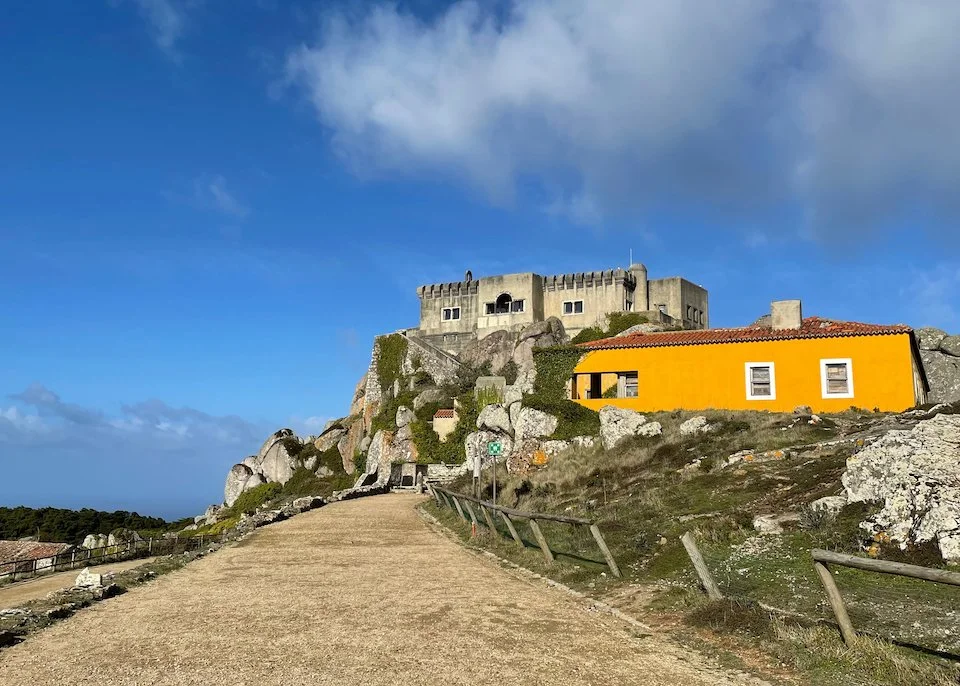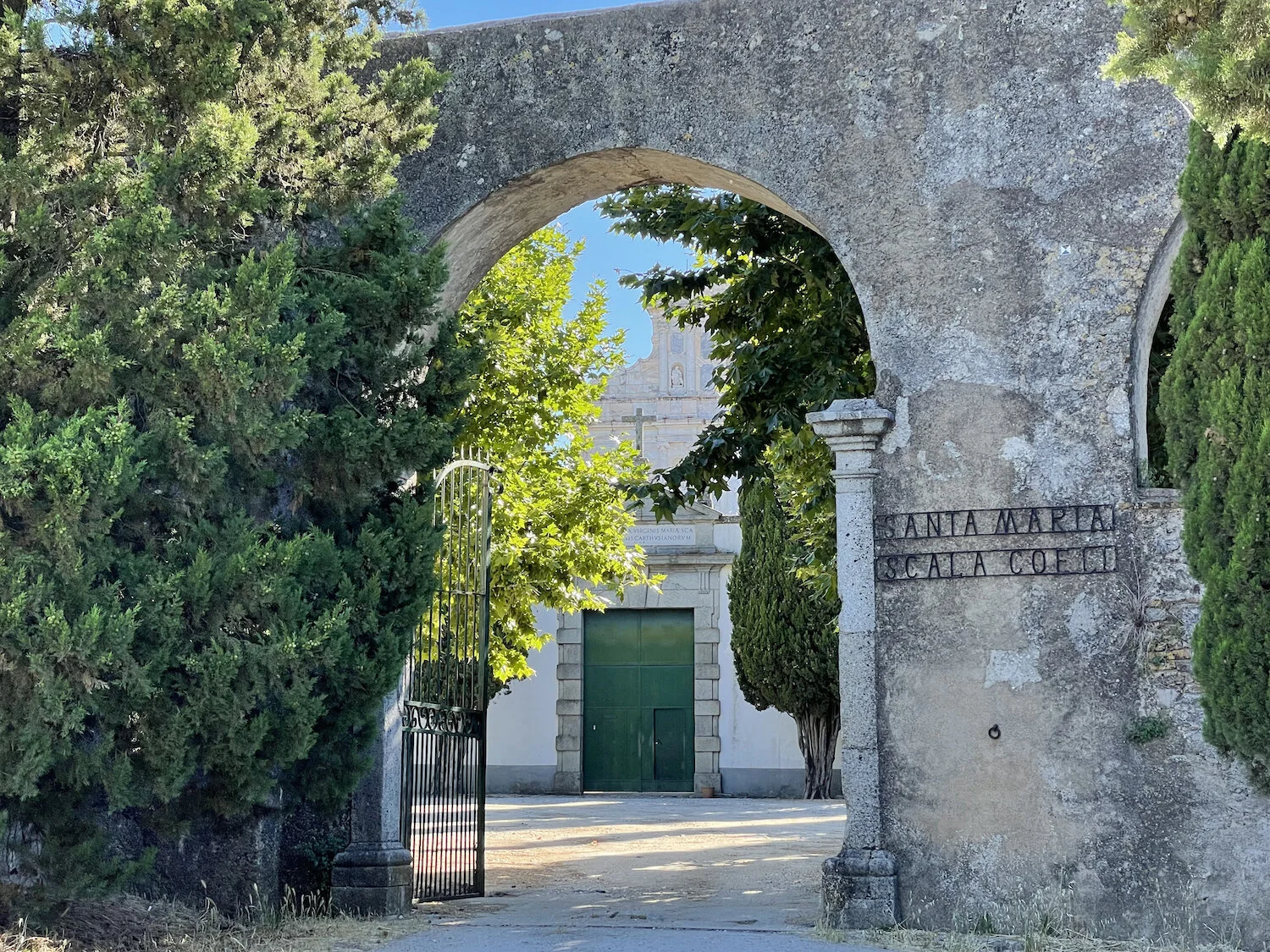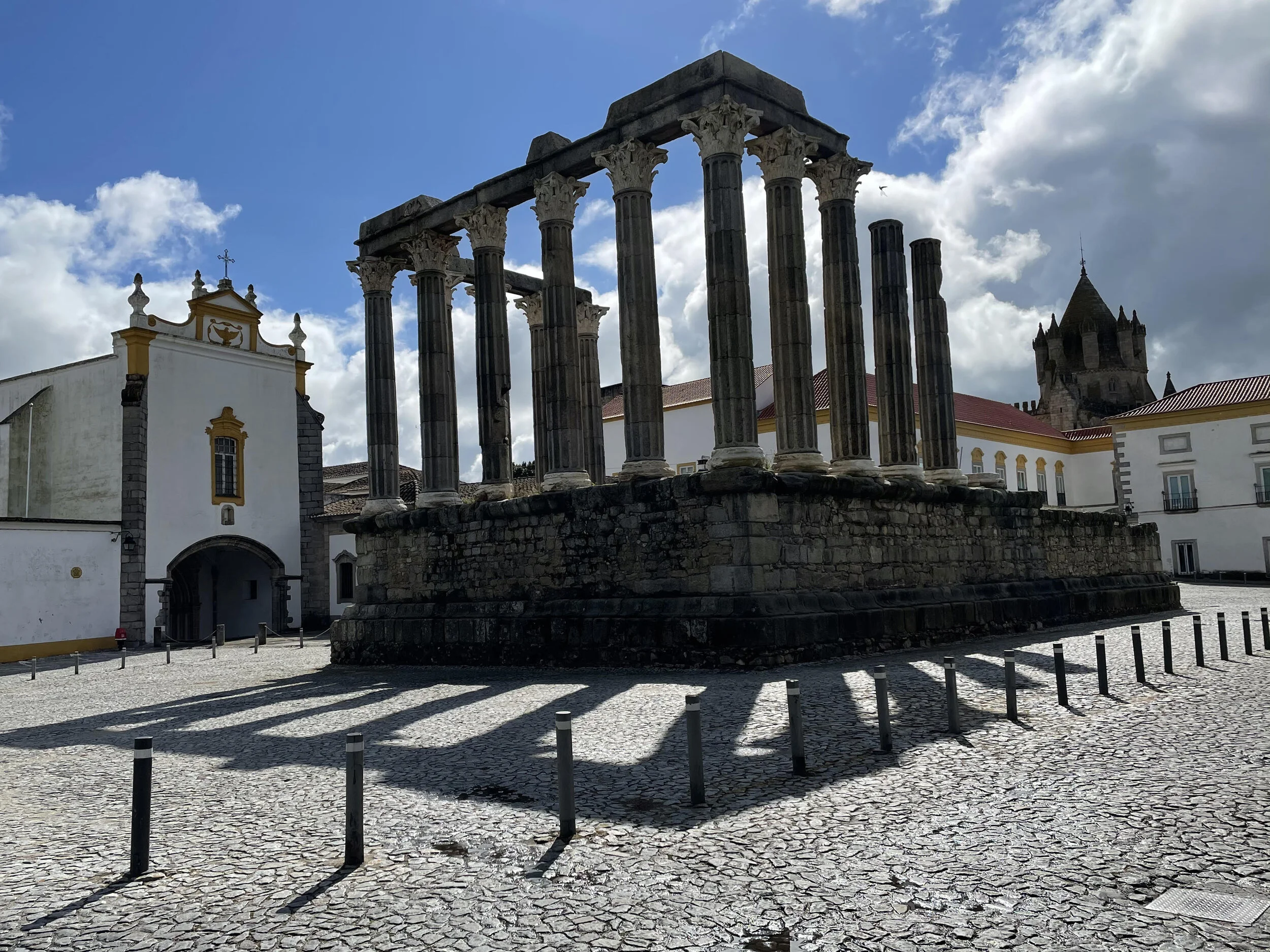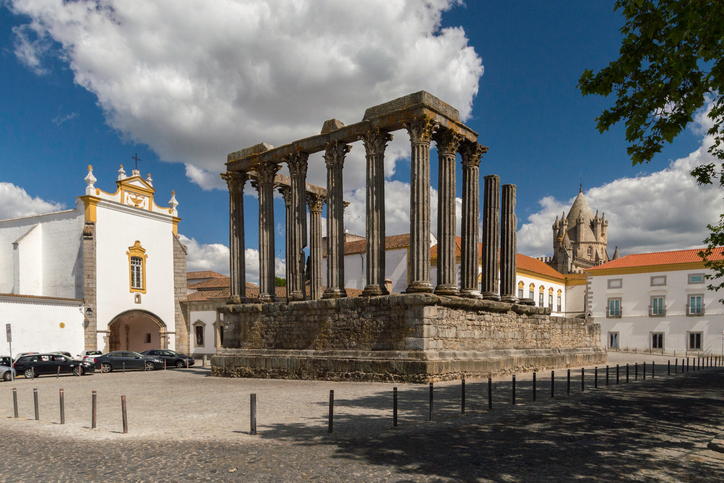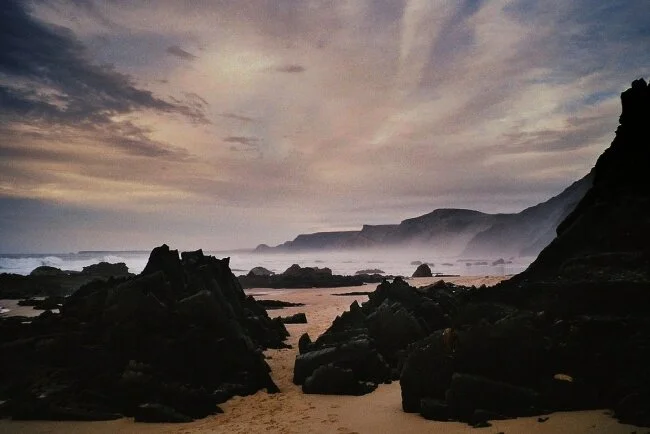It can be tempting to avoid popular tourism attractions when we travel. And yet, as Elyn Aviva shares in this essay, with the right intention and an open mind, it’s still possible to experience the magic that made a place special in the first place.
All tagged Portugal
Miracles at Our Lady of Peninha
When a fear of heights threatens to derail Elyn Aviva from reaching the Sanctuary of Nossa Senhora da Peninha, a place of miracles situated atop a rocky coastal outcrop in Portugal, a stranger appears to help, again and again, at precisely the moments assistance is needed most.
For Whom the Bell Tolls
A personal tour of the Monastery of Santa Maria Scala Coeli, the Cartuxa de Évora, provides a rare opportunity for Elyn Aviva to discover, and share, a place of great spiritual and cultural significance, unique in Portugal.
Breathe in, Breathe Out — An Expat Adapts
Acquisition and release are a necessary part of moving. For Elyn Aviva, who, together with her husband Gary, has relocated from Iowa to Colorado. Colorado to New Mexico. New Mexico to Spain. Spain to Arizona. and now from Arizona to Portugal, the process of adaption has become an exercise akin to breathing: Breathe in, expand, acquire. Breathe out, contract, detach, release.
Blame It On Travel: Why I still have hope.
In a world that seems to be spinning out of control, Ellen Barone is surprised to find that she is still full of hope. Like everyone else, she has moments of disgust and despair, but then, almost miraculously, a ray of light shines through. How does this happen? She blames it on travel.
Searching For A Hidden Western Algarve Beach
by Connie Hand
Admittedly, the beaches in the Portuguese Algarve are famous for their beauty, but they are also very crowded.
Having been to the Algarve several times, I always wondered where the quiet, uncrowded beaches were. There had to be many since the coast was about 60 miles long. But how to find them?
by Connie Hand
The sun was bright under a clear azure sky. The birds were merrily singing on that beautiful Summer morning. As I stood by the country road and stared at the house in front of me, my heart was pounding. I was in Nariz, Portugal standing in front of a house that was typical of the area. But this house was special to me because it was the one in which my father was born. Immediately I thought of the stories he used to tell about his childhood in Portugal and his journey to America.

I always loved to hear about far away places and thought that one day I would travel to Portugal to visit those little towns and big cities that Dad talked about in such a vivid way.
The story of my father, Augusto Silva began on June 8, 1911 in Nariz in the district of Aveiro. He was the second of five children born to Maria and Luis Silva, and it was not an easy life. The family farmed their lands and tried to make ends meet. In 1927, Dad decided to emigrate to the United States, and it was a life-altering decision. He researched what was necessary for his journey. It must have been very hard on both of them when his widowed mother gave him her approval to leave. He told me he vowed to go back to visit this sweet woman, and he did keep that vow. He described that visit with tears in his eyes.
He traveled to Lisbon, the capital of Portugal, and worked there for several months until he discovered that Portugal’s emigration quotas were filled for the next several years. He was advised to travel to France to take up residency in Paris. He told me that he worked in Paris doing odd jobs. I remember Dad telling me that Paris was a huge, beautiful city. He said he saw as many sights as he could, but he really couldn’t wait to get to America.
by Ellen Barone
[this is the final article in our SPOTLIGHT ON PORTUGAL series this week... ]
When the only vices of a place involve food and wine, booking a flight is a no-brainer according to my travel rules. Throw in sandy beaches, cultural riches, mild climate, a lost-in-time pace of life, and an inexpensive cost of living, and you won me over, Portugal.
On a recent visit to the northern wine country, I spent four delicious days table-hopping from hearty lunches, rustic meals featuring unpretentious fare and artisanal feasts prepared by innovative young chefs who bring a creative flare to traditional specialties. Each meal was paired with the region’s fresh, light, aromatic wines known collectively as Vinho Verdes.
 In Porto, the Confeitaria do Bolháo (Rua Formosa 339) proves it doesn’t have to be expensive to be good. I’d wandered into the café for an espresso and to sit out an afternoon rain shower. But I quickly upgraded my order to the meal of choice among the elderly patrons in wool caps and sturdy shoes who packed the place. “Yes, it’s fantastic”, said the waiter, when I asked to have what the couple at the table beside me were so obviously enjoying – a plentiful plate of crispy sardines, crusty bread, a delicious stew of red beans and rice and a carafe of robust red wine. Total bill: 7-euros. Nice.
In Porto, the Confeitaria do Bolháo (Rua Formosa 339) proves it doesn’t have to be expensive to be good. I’d wandered into the café for an espresso and to sit out an afternoon rain shower. But I quickly upgraded my order to the meal of choice among the elderly patrons in wool caps and sturdy shoes who packed the place. “Yes, it’s fantastic”, said the waiter, when I asked to have what the couple at the table beside me were so obviously enjoying – a plentiful plate of crispy sardines, crusty bread, a delicious stew of red beans and rice and a carafe of robust red wine. Total bill: 7-euros. Nice.
 A perfect example of the region’s rustic fare is Restaurante Páteo das Figueiras (Rua do Além 257), a homey establishment near Braga which serves exquisite local cuisine family-style in a simple and cozy room. The caldierada, a stew consisting of a variety of fish and shellfish with potatoes, tomato and onion, scooped up with a garlicky bread, was delicious.
A perfect example of the region’s rustic fare is Restaurante Páteo das Figueiras (Rua do Além 257), a homey establishment near Braga which serves exquisite local cuisine family-style in a simple and cozy room. The caldierada, a stew consisting of a variety of fish and shellfish with potatoes, tomato and onion, scooped up with a garlicky bread, was delicious.
by Judith Fein
[more from our SPOTLIGHT ON PORTUGAL series this week... ]
 photo by erin-thérèse via flickr (common license)Do you believe in miracles? How else can you account for what happened in a field in central Portugal on May 13, 1917, when three shepherd children saw a vision of the Virgin Mary? Purportedly, she told the awe-struck kids that she would appear at the same spot on the l3th of the five following consecutive months. According to believers, up to 70,000 witnesses beheld a miraculous apparition on the 13th day of the last month. Go to Fatima yourself to see if you are uplifted, transported, or merely interested. It’s about one and a half hours from Lisbon by train. The three children are buried in the sanctuary, and in one outdoor area the faithful light long beeswax candles that intertwine as they melt and carry prayers to heaven. Be sure to visit the museum, where Marians from around the world—including Pope John Paul—have left objects that are precious and significant to them. The latter even donated the bullet that was used by the man who tried to assassinate him. He believed that the Virgin of Fatima saved him.
photo by erin-thérèse via flickr (common license)Do you believe in miracles? How else can you account for what happened in a field in central Portugal on May 13, 1917, when three shepherd children saw a vision of the Virgin Mary? Purportedly, she told the awe-struck kids that she would appear at the same spot on the l3th of the five following consecutive months. According to believers, up to 70,000 witnesses beheld a miraculous apparition on the 13th day of the last month. Go to Fatima yourself to see if you are uplifted, transported, or merely interested. It’s about one and a half hours from Lisbon by train. The three children are buried in the sanctuary, and in one outdoor area the faithful light long beeswax candles that intertwine as they melt and carry prayers to heaven. Be sure to visit the museum, where Marians from around the world—including Pope John Paul—have left objects that are precious and significant to them. The latter even donated the bullet that was used by the man who tried to assassinate him. He believed that the Virgin of Fatima saved him.
Perhaps, while you’re in Portugal, you’ll want to find out about the secret Jews in the mountains of central Portugal who were forcibly converted to Catholicism during the Inquisition. After half a millennium of hiding their identity, they finally came out. In Belmonte, where a museum tells the story and shows the artifacts, you’ll be swept into a world where people clung to their religion in the face of great danger and, in the end, faith triumphed over oppression. There is also a synagogue, and you may be fortunate enough to meet some of the Belmonte Jews. When they decided to publicly claim their heritage and faith—about twenty years ago-- the story captivated people round the world, and now Belmonte is one of the top stops in the region for visitors of all religions.
[more from our SPOTLIGHT ON PORTUGAL series this week... ]
When I was a little boy, stories were told around the fireplace about ancestors who were Barons to the monarchy in Portugal and high magistrates to the Tudor monarchy. I always found this exciting and special. I was also a bit skeptical as there were no documents to this effect --only antique photos that could have been gathered at any antique store. Over the years, I made some cursory searches on the web and obtained information about my father and his parents' origin, but nothing was certain, and I had a fair amount of doubt because we are a family known for telling good yarns or, to put it more bluntly, having a proclivity for embellishment.
In September 2009, I decided to do further research on the Portuguese family story to determine where legend and fact intersected. I contacted the Portuguese diplomatic office in Providence, RI and was directed to the Portuguese Consulate in New York. After explaining my intent, I began to correspond with the most important contributor to this story, Miguel Carvalho. He was enthusiastic about my personal Portuguese project and we began to work with the scant information I had-- the surname Soares, the City of Porto and the legend of a family connection to the wine trade. Soon afterwards, I received an email from a history professor from Porto named Gaspar Pereira. He was generous with his research finding that, in 1780, there was a business concern called Soares & Irmao (brother) LLC, and that the business was comprised of two brothers-- Jacquin Manoel Soares and Jose Henrique Soares. Jose Henrique Soares was awarded peerage as the Baron of Ancede by Queen Maria II da Gloria in 1842.

